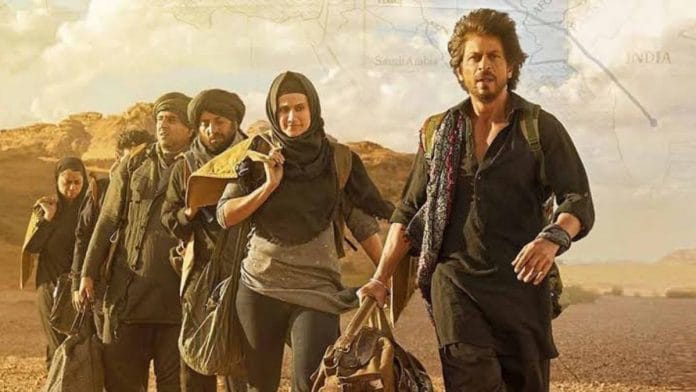It’s that time when you reflect on the grand themes that dominated the year. It’s the time for year-end ruminations. And one way of looking at 2023 is to see it as the year of Shah Rukh Khan.
After a long lull and some troubles, he came back. And how. It began with Pathaan, a blockbuster action movie that was all GI Joe. Then Jawan came with its high political messaging. And now Dunki is all heart, at first glance. And ‘all heart’ is the space that we are familiar with when it comes to Shah Rukh Khan. But a deeper look into the film shows that Dunki is even more political than Jawan in some ways.
It speaks directly to youth despair, drying opportunities and the desperation of people in Punjab (and now even Haryana) to flee to the West. That is one of the biggest political challenges today and for a mainstream Bollywood movie to confront it head-on is what makes director Rajkumar Hirani’s sixth film more than the sum of adjectives people are using—heartwarming, emotional, tearjerker.
For this reason alone, I want to watch the film in a hall deep in Punjab—in towns like Sangrur, Ropar, and Sirsa. Or maybe even in Southall, said Shrayana Bhattacharya, author of Desperately Seeking Shah Rukh.
I want to see the audience’s reactions when the ‘illegal’ migrants are unzipped from the car seats and pulled out of mattresses on their dunki route. No other Indian movie has shown the stark realities of their arduous journeys and the utter helpless enigma of their arrival at their destination. After all that running and hiding, their life in England isn’t very different from the way migrant labourers in Uttar Pradesh and Bihar live in Mumbai—packed like sardines in tiny bunk-beds in tiny rooms.
If that doesn’t wean desperate youth from dunki stowaways, nothing will.
Hirani applies his unique brand of child-like humour to the IELTS classes—the Mukherjee Nagar of Punjab’s migration dreams. Even the clamour for English is politicised with a line about how colonial rulers didn’t know Hindi when they came and conquered India.
Also read: Shah Rukh Khan is the poster boy of reforms. Why is he shutting down factories in Jawan?
What SRK brings
As a continuation of his roles in Pathaan and Jawan, Shah Rukh again plays a soldier in Dunki and offers a benign, non-toxic, non-angry brand of nationalism. He won’t speak ill of his country for the sake of asylum in a foreign land; he won’t lie about persecution in his home country; he speaks out against colonisation and the racial inequalities that the immigration process involves. But even as he calls out the unfair visa regime, he denounces the practice of dunki desperation.
That Shah Rukh Khan agreed to release this film in an unprecedented year of comeback hits is significant. But the movie isn’t really about him, not in the way Pathaan and Jawan were. Dunki is really about Taapsee Pannu’s character Mannu and her life goals. Shah Rukh plays a facilitator of her dream—to flee India. Like all his recent films, women are etched in particularly powerful ways. And in the end, he ensures that it is Mannu’s name that is on the house gate, not her family name.
2023 provides an arc. An arc as wide as his wide-open arms. The arc is a renewed push for the old brand of patriotism in movies. One where enemies can be internal, demons within that need to be fought and won over.
Also read: After Punjab, now Haryana youth fleeing to US–by any ‘donkey’ means possible
Hirani’s John Lennon moment
While Dunki’s politics is a win for Shah Rukh Khan’s arc, it is Rajkumar Hirani’s message that is woolly headed. When the editorial line appears on the screen, he appears to believe in the utopia of a visa-less, borderless world. Very John Lennon-ish romance of Imagine. The text on the screen actually harks back to a century-and-a-half ago when visas were not required for people to travel.
“Imagine all the people
Sharing all the world.”
Hirani goes for the grandiose, larger-than-life drama, only to saddle the script with weak humour in some scenes and a storytelling style that’s too simplistic. He has no solutions or alternatives for Punjab’s desperate youth. Dunki takes on an issue that is rarely in public discussions in India. But it doesn’t go into either the causes or solutions. The movie doesn’t even give a cursory nod to the difficult conversations. It just leaves viewers in a barren land of ‘what next’, the same way desperate youth are left to figure their way out in foreign lands.
(Edited by Prashant)






